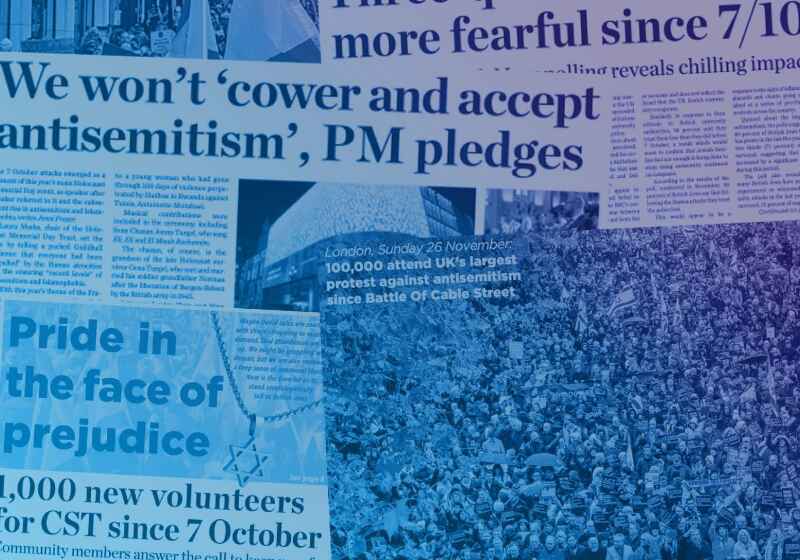CST Blog
CST supporting Restorative Justice in Manchester
8 April 2011
This week saw the official launch of a Restorative Justice partnership between Greater Manchester Police (GMP) and the local Jewish community, hosted at CST's northern region office in Manchester.
Restorative Justice (RJ) offers a structure for victims of crime to explain to offenders the impact that their crime has had on them, and for offenders to apologise for their actions. According to the Restorative Justice Council:
In criminal justice, restorative processes give victims the chance to tell offenders the real impact of their crime, to get answers to their questions, and an apology. It lets offenders understand the real impact of what theyve done, to take responsibility and make amends. Restorative Justice holds offenders to account for what they have done, personally and directly, and helps victims to get on with their lives.
Alongside criminal justice, restorative processes are increasingly being used in schools, care homes and the wider community to address conflict, build understanding and strengthen relationships with young people. In these contexts it is also known by the names 'Restorative Approaches' and 'Restorative Practices'.
All restorative work is underpinned by principles and best practice, building on a strong evidence base.
As well has helping victims, research evidence shows that RJ reduces re-offending rates, thereby reducing crime.
The launch event was attended by representatives from CST, the Jewish Community and GMP. The keynote speech was delivered by Divisional Commander Kevin Mulligan of GMP Salford Division, who was accompanied by Inspector Gail Spruce, who is GMPs lead on Restorative Justice.
Left to right: Simon Walton (GMP Restorative Justice Project); Rabbi Yehuda Brodie (Manchester Beth Din); Divisional Commander Kevin Mulligan; Insp Gail Spruce; Lucille Cohen (President of The Jewish Representative Council of Greater Manchester and Region). Photo: Michael Poloway.
GMP Assistant Chief Constable Garry Shewan, who is the Association of Chief Police Officers (ACPO) lead on RJ, said:
Restorative Justice has made a difference in our communities in terms of really unpicking the causes of anti-social behaviour and crime.
Restorative Justice brings everyone in the community together to combat crime and anti-social behaviour and puts victims first, giving them more control over how an offender is dealt with.
We are really pleased to be working with CST and reaching out to members of our Jewish communities to explain how Restorative Justice can work for them.
Tackling hate crime is a priority for Greater Manchester Police. We understand there maybe people who do not want to report hate crime for a number of reasons. Restorative Justice is another way of dealing with hate crime that is tailored to the victims needs, and can play an important role in educating people about hate crime and the effects of antisemitism. Our work with CST will hopefully encourage people to report hate crime and together we will deal with it in the ways that suit their needs.
Rabbi Yehuda Brodie, Registrar to the Manchester Beth Din, said:
The concept of RJ whereby restitution is coupled with remorse and a plea for forgiveness is basic to Jewish Law. There cannot be closure for any crime against the person whether verbal or physical or for any act of damage to a person's property or reputation without genuine regret for one's actions and a sincere apology to the victim. This approach of dealing with offences by restoring the victim's self esteem and bringing the perpetrator face to face with the target of his criminal and anti-social behaviour is therefore to be applauded.
CST is a supporter of the RJ process, believing that that positive outcomes from RJ will encourage members of the community, who currently do not wish to report antisemitic incidents or other crimes to the police for a number of reasons (such as not wanting to waste police time, or assuming that there will be no benefit in reporting offences), to be more willing to report them. CST has already participated in positive examples of RJ in the GMP area, involving Jewish victims of crime, and those who perpetrated the crimes.
CSTs Manchester office is playing an active role in the piloting of RJ and will be:
- Acting as a surrogate, where the victim does not want to come face to face with the offender in the RJ process
- Facilitate learning sessions, for example by explaining the effect of antisemitism on the victim or bringing in other experts, such as Holocaust educators
- Identifying other members of the Jewish community to be involved in the piloting, consultation and publicity processes for RJ



